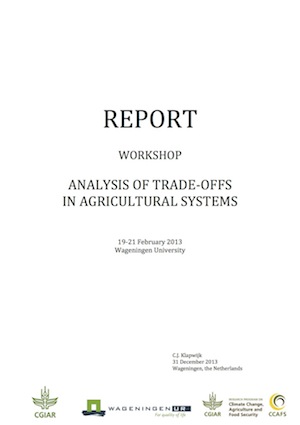Workshop report: Analysis of trade-offs in agricultural systems
The objectives of the workshop were to (i) share and exchange experiences and lessons on available methods and tools to identify and analyse trade-offs in agricultural systems (at different levels: from household to landscape, regional and global level), (ii) to discuss and explore how we can apply the lessons learned within and between the respective CRPs, (iii) to explore potential for synergies and collaboration between scientists and programs on trade-off analysis in agricultural systems, (iv) to discuss how results from trade-off analysis research can be translated to end-users to achi





